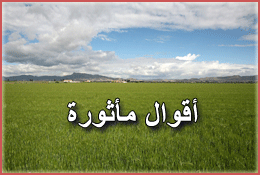-
Ahlan abohedaya;
Thanks a lot for your nice words, and thanks for spreading the word.
Hope you'll get the best of ArabicPod :)
Salaaaam -
Ahlain,
I am very gratefull for all this lessons that you gave us here.
I have some question about proverbs and verbs used there:
I.
istaqarra means to settle(in present we say: ana astaqeerro-I settle)
Example of sentence to make sure that I am using it properly.
1)I want to settle down in the village soon.
اريد ان استقر في القرية قريبا
Transcription:Ored an astaqreero fe qarya qareban.
The second verb is tajAwaza- means like to pass by,going past.In present ana atajawazo -I pass by...)
2)I crossed the bound between Poland and Germany.
اتجاوزت الحدود بين بولندا و المانيا
AtajAwazto al-hodod bayn Bolanda wa almAneya.
III.
Verb :3aTa-to give
I am not sure about present tense (ana Ot3ey-I give)
1)I will give a gift for him
سوف اعطي هديةلك
Sawfa Otey hadeya lak.
Thanx for quick correction. You are really doing great job .
Ila liqa2a
Czarek
ِ
-
Ahlain w sahlain czarek25;
Shokran for your nice words,,let me answer your question in the order:
- Yes, the verb (istaqarra) means (to settle), and your example is right, however, the transcription shows there is some simple grammatical mistakes, like (Ored an astaqreero) should be (Ored an astaqreera) because the word (an) puts (fat7a) to the end of the word that comes after it.. so I would write the sentence like (Ureed an astaqrra fe alqaryah qareeban).
- The verb (tajawaza) means to bypass, your example is important, because I see you’ve use (alef) in the beginning and put (ta) in the end (اتجاوزت) now this is wrong, the verb in English is in past tense, therefore all what you had to do is to put the (ta) in the end so it bocomes (تجاوزت).. if it was present tense then you put the (alef) but take off the (ta) like (أتجاوز).. Both (alef) and (ta) should not come in the same word to mean (I).
- The last verb (3ata) should be (a3ta) or (a36a – أعطى) and as you said it means (to give).. I give is (ana u36y – أنا أعطي) .. Your example in English should be (I’ll give him a gift) which is (سوف أعطي لك هدية) in Arabic.
Your Arabic level is very good, I wish you the best in improving your level.
Ta7eyyaty
Ehab
-
Ahlain,
Thanx a lot Ehab.You gave me a very nice correction.This is my first time that I participate in such an internet classes,and I really like it.I 'am learning by myslef actually for 5 months(from 2 months regulary)so it is not easy but I am keep going it all time ,cos' Arabic is very nice language.You are very handy for me,and from now you can be sure that I will gonna bother you as much as I can(of course in positive way).I wanna participate in all lessons so I subscribe today.
Hope to hearing from you guys soon
Khatrak -
سلام
This is totally unrelated, but I'm trying to figure out the verb conjugations for "to write"
I think that "I write" is:
اكتب -- akatabu?
but I don't know the other ones. Can you set me straight?
شكرا -
and... how do you spell table?
-
Table is طاولة
أكتب is right (I write), the rest of the present tense conjugations are coming soon in a special lesson ;)
Keep it up
-
This site is really commendable. It's very clear, gramatically perfect and the guys are excellent.
I have improved a lot, my friends says.
Credit goes to Arabicpod -
The Human conscience is an open wound only truth can heal it - Shaikh Uthman Fudi
-
Ahlan,
I did not understand in the second proverb why past tense (قطعك) was used where the meaning is future tense (will cut).
Would you please shed some light on this point??
Ferhan
-
@frhn, the English translation is not a literal direct translation of the Arabic text, but the best translation in English.
Literally, the second proverb is
The time like the sword if you did not cut it it cut you
تقطع is a present tense verb which means you cut. The ت at the beginning indicates you or she.
Now if you add لم before a present tense verb, the tense becomes past e.g. لم يفعل is he did not do
قطعك is a past tense verb (not a future tense) which means it/he cut you -
jazakkAllahu khayran brothers, may Allah protect you
Lower Intermediate - Arabic proverbs
| June 10th, 2008 | 13 comments |
Join us in this podcast where we explore some popular Arab sayings. Some may be similar to English ones you may have heard, and others unique to the Arabic language. Don't forget to visit the lesson discussion page to post any good sayings you know and share them with all of us here at ArabicPod.
 |
 MP3 Download MP3 Download
 PDF Transcript PDF Transcript
|
 Audio Transcript Audio Transcript Exercise Exercise |
|
| Basic | Premium | |
|---|---|---|
Join the Discussion

Random Word
مزرعة |
|

Advertisement



Without doubt you brothers have done a great job. I must say this is a priceless gift, for anyone that want to learn a new language i.e. Arabic. May Allah strengthen you brothers and give you ultimate rewards.
This is my first lesson; I am impressed; however I am going to spread the news.
Wasalaam
Abohedaya